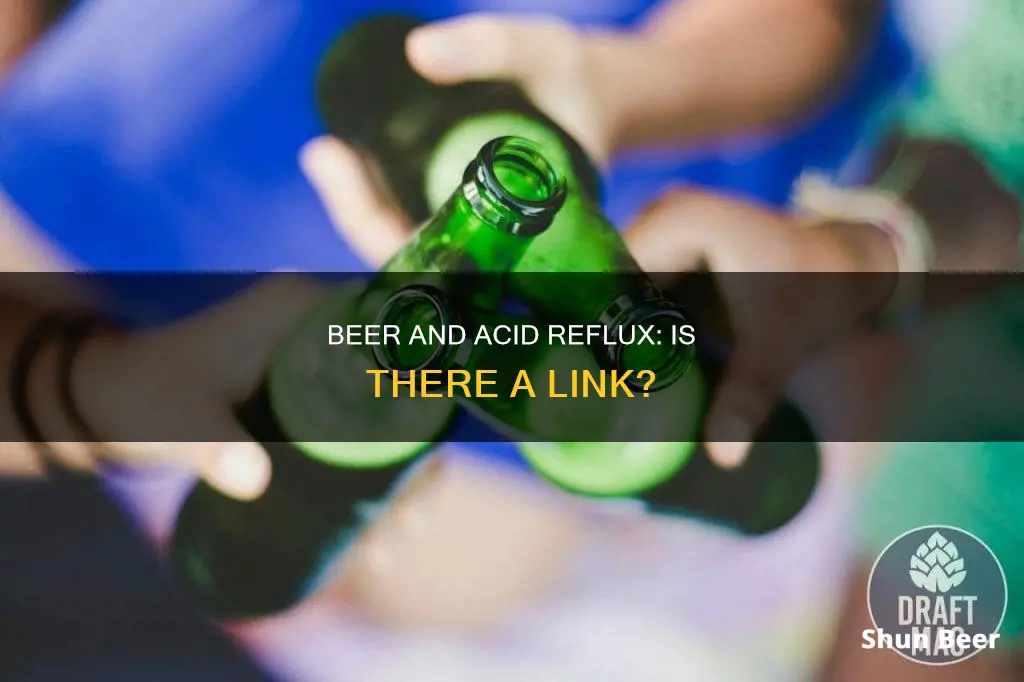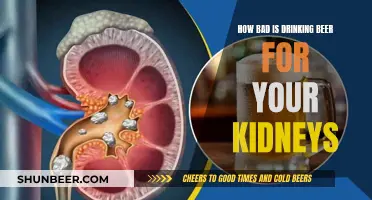
Alcohol is a known trigger of acid reflux and gastroesophageal reflux disease (GERD), a more severe form of acid reflux. Acid reflux occurs when stomach acids flow back up into the esophagus, causing pain, discomfort, and other symptoms like vomiting and chest pain. When the lower esophageal sphincter (LES) malfunctions, stomach acids flow back up into the esophagus, causing acid reflux. Alcohol can trigger acid reflux in two ways: by triggering GERD and by causing dehydration, which makes acid reflux symptoms worse. All types of alcohol can trigger GERD when consumed in excess, but some types are less likely to trigger it when consumed in moderation. For example, spirits with high ethanol content, such as gin, whiskey, and cognac, do not tend to stimulate stomach acid secretion and may be better for people with acid reflux. Additionally, drinking water and making lifestyle changes can help prevent and relieve acid reflux.
| Characteristics | Values |
|---|---|
| Can drinking beer cause acid reflux? | Yes, drinking beer can cause acid reflux. |
| What is acid reflux? | Acid reflux is when stomach acids flow back up into the oesophagus, causing pain and discomfort. |
| What causes acid reflux? | Acid reflux is caused by a malfunction in the lower oesophageal sphincter (LES), which is supposed to keep stomach acids from flowing back up into the oesophagus. |
| How can alcohol consumption lead to acid reflux? | Alcohol can trigger acid reflux by triggering GERD and acting as a diuretic, causing dehydration and worsening acid reflux symptoms. Alcohol can also cause the LES to malfunction, leading to increased acid reflux. |
| Are there ways to drink alcohol without causing acid reflux? | It is recommended to avoid drinking alcohol altogether if you suffer from acid reflux. However, drinking in moderation, staying hydrated, avoiding acidic or carbonated drinks, and eating small meals may help minimise the risk of worsening acid reflux symptoms. |
| Are there alcoholic beverages that are less likely to cause acid reflux? | Spirits with a high ethanol content, such as gin, whiskey, and cognac, are less likely to stimulate stomach acid secretion and may be better options for people with acid reflux. |
What You'll Learn
- Alcohol relaxes the lower esophageal sphincter, allowing stomach acid to flow back up into the esophagus
- Alcohol is a diuretic, leading to dehydration, which worsens acid reflux symptoms
- Drinking alcohol increases the likelihood of engaging in behaviours that trigger acid reflux, such as overeating, smoking, and consuming fried fatty foods
- All types of alcohol can trigger acid reflux when consumed in excess, but some types are less likely to cause issues when consumed in moderation
- Carbonated and caffeinated beverages can also trigger acid reflux, so alcoholic drinks containing coffee or soda may be best avoided

Alcohol relaxes the lower esophageal sphincter, allowing stomach acid to flow back up into the esophagus
Alcohol is a known trigger of acid reflux and gastroesophageal reflux disease (GERD). When you drink alcohol, it relaxes the muscles that open and close the lower esophageal sphincter (LES). The LES is a valve that separates the stomach from the esophagus and prevents stomach acid from flowing back up into the esophagus. When the LES malfunctions or relaxes, it can allow stomach acid to flow back up into the esophagus, causing acid reflux.
The esophagus is a long tube that carries food and drink from the mouth to the stomach. The LES normally yields with pressure and relaxes after each swallow to allow food to pass into the stomach. However, when the LES does not sufficiently contract or when the pressure in the stomach exceeds the pressure created by the LES, reflux occurs. Alcohol can cause the LES to relax, leading to reflux of stomach contents into the esophagus.
In addition to relaxing the LES, alcohol can also contribute to other behaviours that trigger acid reflux, such as overeating, smoking, and consuming fried fatty foods. Social drinking is often paired with these behaviours, which can further increase the risk of acid reflux.
The risk of acid reflux from alcohol consumption can be reduced by drinking in moderation, staying hydrated, and avoiding eating late at night or lying down immediately after drinking. These measures can help prevent dehydration, which can worsen acid reflux symptoms, and reduce the risk of acid reflux flare-ups.
While all types of alcohol can trigger GERD when consumed excessively, distilled spirits with a high ethanol content, such as gin, whiskey, and cognac, are less likely to stimulate stomach acid secretion and may be better choices for people prone to acid reflux. However, the choice of mixer can also influence the likelihood of getting heartburn, as citrus juices, carbonated beverages, and caffeinated drinks can trigger acid reflux.
Beer and Sertraline: What You Need to Know
You may want to see also

Alcohol is a diuretic, leading to dehydration, which worsens acid reflux symptoms
Alcohol is a diuretic, which means that it causes you to urinate more frequently. This can lead to dehydration, which is known to worsen acid reflux symptoms. In addition to this, alcohol can also cause the lower esophageal sphincter (LES) to malfunction, which can lead to increased acid reflux symptoms. The LES is a valve that opens and closes to allow food and drink to pass into the stomach and then prevents it from passing back into the oesophagus. When the LES malfunctions, it may not close all the way or may open when it shouldn't, allowing the contents of the stomach to flow back into the oesophagus, resulting in acid reflux.
Alcohol is a known trigger of gastroesophageal reflux disease (GERD), a more severe form of acid reflux. According to a 2019 review, drinking alcohol can increase the risk of developing GERD, with higher intake and frequency being more strongly linked to the condition. However, other studies have found conflicting results, with some suggesting that drinking three or fewer alcoholic beverages a week may be associated with GERD, while others found no association between alcohol consumption and GERD.
To minimise the risk of acid reflux, it is recommended to limit alcohol consumption or avoid it altogether. Staying hydrated, drinking in moderation, and avoiding drinking acidic or carbonated beverages can also help reduce the risk of worsening acid reflux symptoms.
Beer and Cancer: What's Safe to Drink?
You may want to see also

Drinking alcohol increases the likelihood of engaging in behaviours that trigger acid reflux, such as overeating, smoking, and consuming fried fatty foods
Drinking alcohol can trigger acid reflux in two ways. Firstly, alcohol is a known trigger of gastroesophageal reflux disease (GERD), a severe form of acid reflux. Secondly, alcohol is a diuretic, which means it makes you urinate more frequently, leading to dehydration, which can worsen acid reflux symptoms. In addition, alcohol can cause the lower oesophageal sphincter (LES) to malfunction, allowing stomach acid to flow back up into the oesophagus, resulting in acid reflux.
Alcohol consumption is also associated with behaviours that can trigger acid reflux. These include:
- Overeating: Alcohol can stimulate food intake and amplify your perception of appetite, leading to overeating. Large meals can increase the risk of acid reflux.
- Smoking: Social drinking is often paired with smoking cigarettes, which can trigger acid reflux. Tobacco can stimulate stomach acid production and cause the muscles between the oesophagus and stomach to relax, allowing acid reflux to occur more easily.
- Consuming fried fatty foods: Fried, fatty foods are commonly consumed alongside alcohol and can trigger acid reflux.
Therefore, drinking alcohol increases the likelihood of engaging in behaviours that can trigger acid reflux, such as overeating, smoking, and consuming fried fatty foods. It is important to note that heavy drinking can increase the risk of acid reflux flare-ups and worsen symptoms.
Do Beer Cozies Work? The Science Behind It
You may want to see also

All types of alcohol can trigger acid reflux when consumed in excess, but some types are less likely to cause issues when consumed in moderation
Alcohol is a known trigger for acid reflux and gastroesophageal reflux disease (GERD), a more severe form of acid reflux. However, the relationship between alcohol consumption and GERD is complex and not yet fully understood. While heavy drinking is a risk factor for GERD, some studies suggest that drinking in moderation may not have the same effect.
When you drink alcohol, it relaxes the muscles that control the esophageal sphincter, a valve that opens and closes to allow food and drink to pass into the stomach and prevents stomach contents from flowing back into the esophagus. When this valve malfunctions, it can allow stomach acid to escape into the esophagus, causing acid reflux. Additionally, alcohol is a diuretic, which can lead to dehydration and worsen acid reflux symptoms.
All Types of Alcohol Can Trigger Acid Reflux
All types of alcohol can trigger acid reflux when consumed in excess. However, some types of alcohol are less likely to cause issues when consumed in moderation. For example, spirits with a high ethanol content, such as gin, whiskey, and cognac, do not tend to stimulate stomach acid secretion and may be better choices for people prone to acid reflux. On the other hand, drinks with lower ethanol content, such as beer and wine, may be more likely to trigger reflux.
Other Factors to Consider
The risk of acid reflux from alcohol consumption is also influenced by other factors, such as the type of mixer used, the amount of food consumed, and individual physiological differences. For example, drinking alcohol with acidic mixers, such as citrus juices or carbonated beverages, can increase the risk of acid reflux. Additionally, alcohol can contribute to overeating, and a full stomach can increase the likelihood of reflux. Individual factors, such as weak esophageal muscles or hiatal hernias, can also make it more difficult to control acid reflux.
Tips to Reduce the Risk of Acid Reflux
For those who suffer from acid reflux, it is generally recommended to avoid alcohol altogether. However, for those who choose to drink, there are some strategies that may help minimize the risk of acid reflux:
- Drink in moderation: Heavy drinking increases the risk of acid reflux flare-ups.
- Stay hydrated: Alcohol is dehydrating, which can worsen acid reflux symptoms.
- Avoid certain mixers: Acidic or carbonated mixers, such as citrus juices or carbonated beverages, can irritate the stomach and increase acid reflux.
- Eat small meals: Large meals can increase the risk of acid reflux.
- Avoid late-night snacks: Eating late at night can aggravate acid reflux symptoms.
Cancer Patients and Beer: What's Safe to Drink?
You may want to see also

Carbonated and caffeinated beverages can also trigger acid reflux, so alcoholic drinks containing coffee or soda may be best avoided
Carbonated and caffeinated beverages can trigger acid reflux, so alcoholic drinks containing coffee or soda are best avoided. Carbonated drinks, such as soda and hard seltzers, can irritate the stomach and increase acid reflux symptoms. Similarly, caffeinated drinks like coffee and tea can cause heartburn. Therefore, cocktails containing coffee or carbonated drinks are likely to trigger acid reflux.
Alcoholic drinks containing citrus juices or garnishes should also be avoided, as the citric acid in oranges, lemons, and other citrus fruits can cause heartburn. In addition, alcoholic drinks with tomato juice, such as Bloody Marys, should be skipped, as tomatoes are another common trigger of acid reflux.
If you want to minimise the risk of acid reflux, spirits with a high ethanol content, such as gin, whiskey, and cognac, are a better choice. These drinks are less likely to stimulate stomach acid secretion than beverages with lower ethanol content.
It's also important to watch what you mix your alcohol with. Non-alcoholic drinks like orange juice and carbonated beverages can also trigger acid reflux. Switching to low-acid fruit juices, like apple or carrot juice, or mixing drinks with water may help reduce acid reflux symptoms.
Liver Transplant and Alcohol: Is Drinking Beer Safe?
You may want to see also







